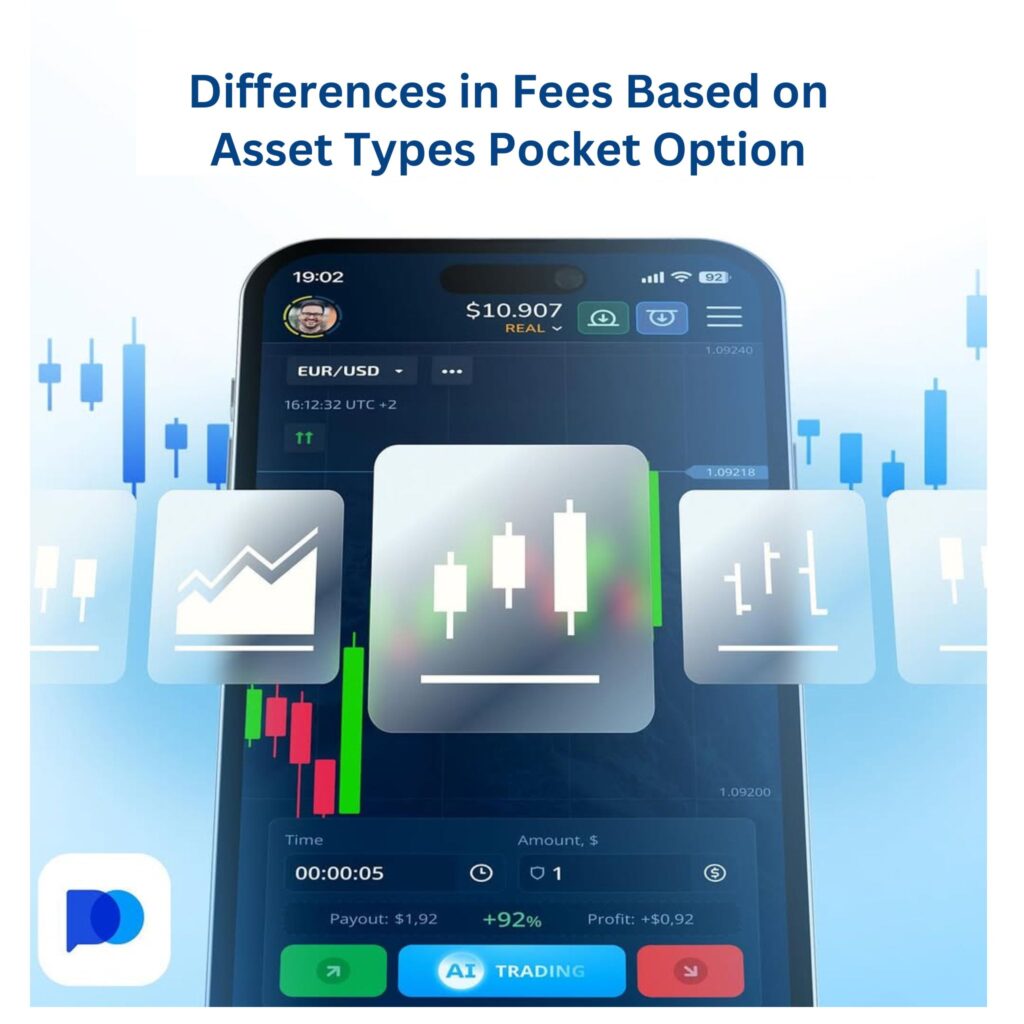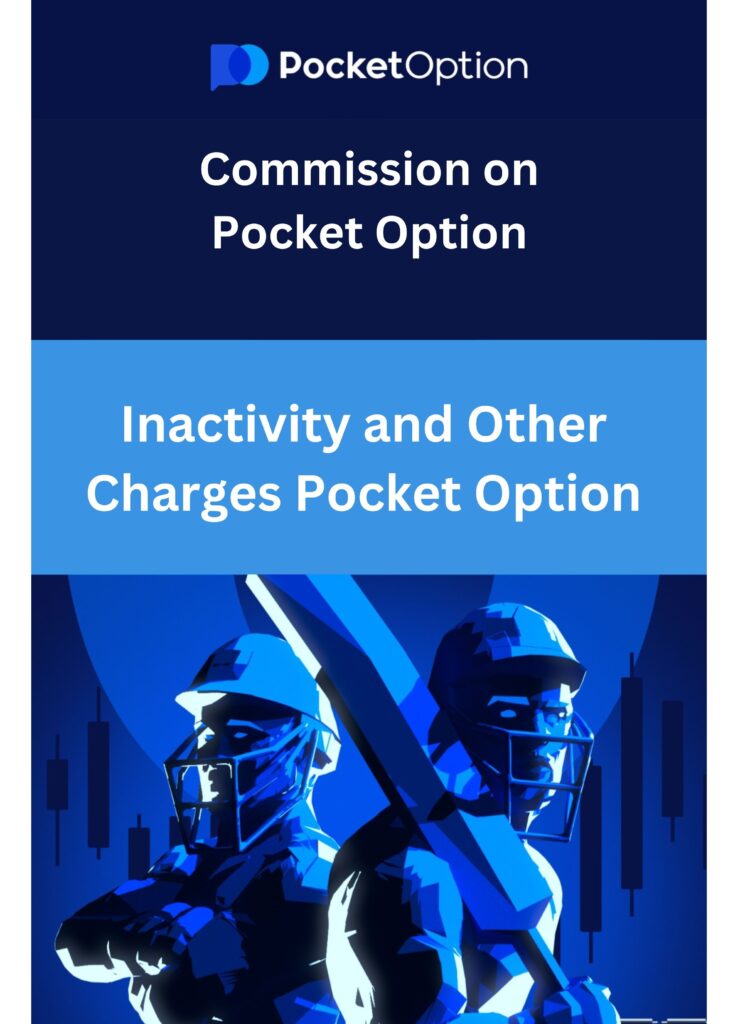Fees on Pocket Option
Understanding the fees on Pocket Option is essential for managing your trading costs and maximizing profits. The platform offers competitive spreads, low withdrawal fees, and transparent pricing. This section will guide you through the different types of fees you might encounter, helping you plan your trades more efficiently and avoid unexpected charges.
Why Understanding Pocket Option Fees is Important for Traders
Knowing how Pocket Option commission work helps traders make smarter decisions and manage their trading budget effectively. Fees such as spreads, withdrawal charges, or inactivity costs can directly affect your profits. By understanding these costs upfront, you can better calculate potential returns, choose the right assets, and select cost-effective payment methods. This awareness ensures you avoid unexpected charges and helps you focus on maximizing your trading performance.
Types of Pocket Option Commission
When trading on Pocket Option, it’s important to be aware of the different types of commissions and charges that may apply. Here are the main types:
Trading Fees (Spreads)
Pocket Option doesn’t charge traditional commissions per trade but operates on spreads. The spread is the difference between the buying and selling price of an asset. This cost is built into the trade and varies depending on the asset type and market conditions.
Withdrawal Fees
There may be fees for withdrawing funds, depending on the payment method you use. For example, cryptocurrency withdrawals may have small network fees, while bank transfers or e-wallets might carry fixed charges. Always check the fee details before initiating a withdrawal.
Deposit Fees
Generally, Pocket Option does not charge fees for deposits. However, your payment provider (bank, e-wallet, or crypto network) may apply transaction fees, so it’s good to confirm with them beforehand.
Inactivity Fees
If your account remains inactive for a long period (usually 90 days or more), Pocket Option may charge an inactivity fee. This encourages active participation and helps maintain account security.
Content Overview Fees on Pocket Option
- Why Understanding Pocket Option Fees is Important for Traders
- Types of Pocket Option Commission
- Trading Fees Explained on Pocket Option
- Deposit and Withdrawal Fees on Pocket Option
- Inactivity and Other Charges Pocket Option
- How to Minimize Fees on Pocket Option
- Frequently Asked Questions Pocket Option Commission
Trading Fees Explained on Pocket Option
Understanding trading fees on Pocket Option is essential for managing your costs and maximizing profits. Here’s how the fee structure works:
How Spreads Work on Pocket Option
Instead of charging direct commissions per trade, Pocket Option uses spreads. A spread is the difference between the buy price and the sell price of an asset. This cost is automatically factored into every trade you place. The size of the spread can vary depending on market conditions, liquidity, and the specific asset being traded.
Are There Any Commissions Per Trade?
Pocket Option does not charge fixed commissions on individual trades. Instead, your trading cost comes from the spread. This makes the fee structure simple and transparent, as you only need to account for the spread when calculating your potential costs and profits.
Differences in Fees Based on Asset Types (Crypto, Forex, Stocks)
- Cryptocurrencies: Typically have wider spreads due to higher market volatility.
- Forex Pairs: Often feature lower spreads because of higher liquidity and stable market conditions.
- Stocks and Commodities: Spread sizes can vary depending on the specific asset and its market activity.
Understanding these variations helps you choose the right assets for your trading strategy and manage fees effectively.

Deposit and Withdrawal Fees on Pocket Option
Managing your funds efficiently on Pocket Option requires understanding the deposit and withdrawal fees, as well as the processing times. Here’s what you need to know:
- Bank Cards (Visa/Mastercard): Generally, no deposit fees are charged by Pocket Option, but your bank might apply a transaction fee.
- E-Wallets (Skrill, Neteller, etc.): Usually, no deposit fees are applied by the platform, though the e-wallet provider may charge small fees.
- Cryptocurrencies (Bitcoin, Ethereum, etc.): No platform fees, but blockchain network fees apply depending on the crypto used and current network congestion.
- Bank Cards: May involve a small withdrawal fee, depending on the bank and region.
- E-Wallets: Typically low or no withdrawal fees, but it depends on the specific service provider.
- Cryptocurrencies: Withdrawals may include network fees, which vary based on the cryptocurrency and current network conditions.
Always check the specific fee for your chosen method before initiating a withdrawal.
- Deposits: Usually instant for bank cards, e-wallets, and cryptocurrencies. Crypto deposits may take a bit longer, depending on blockchain confirmation times.
- Withdrawals: Typically processed within 24 hours by Pocket Option, but the total time may vary based on the payment method.
Understanding these fees and processing times helps ensure smooth financial transactions on Pocket Option and prevents surprises during deposits or withdrawals.
Inactivity and Other Charges Pocket Option
In addition to trading and transaction fees, Pocket Option may apply certain inactivity fees and other charges that traders should be aware of to manage their accounts effectively.
When Inactivity Fees Are Charged
If your Pocket Option account remains inactive (no trading, deposits, or withdrawals) for 90 consecutive days or more, an inactivity fee may be applied. This fee is typically a small amount deducted monthly to maintain your account. The purpose of this charge is to encourage active use of the platform and help cover administrative costs.
Other Potential Costs
- Currency Conversion Fees:
If you deposit or withdraw funds in a currency different from your account’s base currency, conversion fees may apply. These fees depend on the payment provider or the platform’s currency exchange rates. - Overnight Fees (Swap Fees):
While Pocket Option primarily offers short-term trading (like digital options), if you engage in forex CFD trading or hold positions overnight, overnight fees (also known as swap fees) might be charged. This fee compensates for the cost of holding a leveraged position overnight.
By understanding these additional charges, you can better manage your account activity and avoid unnecessary fees on Pocket Option.

How to Minimize Fees on Pocket Option
| Tip to Minimize Fees | Description |
| Choose Cost-Effective Payment Methods | Select payment methods like e-wallets or cryptocurrencies that typically have lower withdrawal fees. |
| Avoid Inactivity Fees | Stay active by making trades or transactions at least once every 90 days to avoid inactivity charges. |
| Trade During Optimal Market Hours | Trade during high liquidity hours to benefit from tighter spreads and reduce trading costs. |
| Use the Demo Account for Practice | Practice strategies in the demo account to avoid unnecessary live trading fees. |
| Monitor Currency Conversion Costs | Use payment methods in your account’s base currency to prevent currency conversion fees. |
Frequently Asked Questions Pocket Option Commission
Does Pocket Option charge hidden fees?
No, Pocket Option maintains a transparent fee structure. All applicable fees, such as spreads, withdrawal charges, or inactivity fees, are clearly outlined on the platform. There are no hidden fees—traders can review all costs before making any transactions.
Are there fees for using a demo account?
No, the demo account on Pocket Option is completely free to use. It provides full access to the platform’s tools and features, allowing you to practice trading strategies without risking real money or incurring any charges.
How can I check the fees before making a trade?
You can view the spread and potential payout rate for each asset directly on the Pocket Option trading interface before placing a trade. Additionally, the finance section of your account provides details on withdrawal fees and other charges related to deposits or inactivity.
